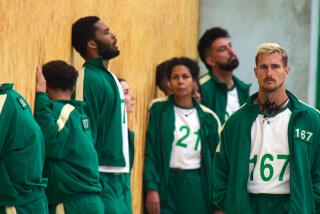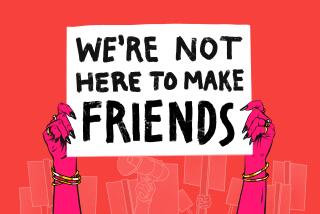On Swedish Series, Some Castaways Are Now Crying Foul
- Share via
STOCKHOLM — On Sweden’s spectacularly popular “Expedition: Robinson”--which comes to CBS tonight renamed “Survivor”--16 people are marooned on an island with little more than the shirts on their backs and a team of cameramen on their heels. Every four days they vote to expel one of their own, until only one survives.
Deniz Ozen--a contestant on last season’s “Expedition: Robinson”--wasn’t the one, and the failure still galls him. “I really hate to lose,” he admits. “I really get angry.”
It is easy to spot Ozen at the crowded department store in downtown Stockholm where he has agreed to meet a reporter. He is a tall and strongly built Turk, with jet-black hair and a dark complexion that instantly sets him apart from the sea of light-skinned faces.
Ozen, a 30-year-old computer software entrepreneur, has taken to calling “Robinson” “a Mickey Mouse show” and has accused producers of jury-rigging the program’s rules, making it impossible for the most able contestants to win. He also claims that contestants smuggle goods onto the island--strictly verboten, of course. But he should know: Coca-Cola, gin, cigars, sausages, tea, coffee, sugar, rice and Tabasco were found hidden at his team’s campsite on Cadlau Island in the Philippines last summer.
Ozen’s complaints may sound like a sore loser’s carping. And maybe they are. But they’ve been accorded front-page treatment in many Stockholm newspapers, becoming an embarrassment for Sveriges (Swedish) TV, the national broadcaster that aired “Robinson” each Saturday night last fall.
But SVT is used to such controversy. The network has been bombarded with flak since the show’s 1997 premiere. Helena Broden, SVT’s senior press officer, readily admits that “yes, we have to defend ourselves all the time,” and adds that, yes, the odds were intentionally stacked against Ozen’s team after the smuggling operation was uncovered.
‘Robinson’ Pulls In Half of the Audience
Even before “Robinson” hit the air, many Swedes were appalled at the idea of a show in which contestants actually voted teammates off an island. So mean-spirited, so unsportsmanlike, so un-Swedish. A nation--which has long cherished a quintessentially diplomatic self-image--wondered: What is this monstrosity all about?
Even the winner of the most recent “Robinson” is not a particularly happy camper. He is Jerker Dalman, a 22-year-old gay man who was infuriated by the crush of media attention after winning and rebuffed overtures by leaders of the Stockholm gay community to become a symbol. He is reportedly living in seclusion in Paris.
So why be a contestant or a broadcaster? Because “Robinson” weekly scores around a 50% share of the viewing audience; last season’s finale was seen by nearly 3 million people, more than a third of the entire population. A similar performance in the United States would mean 90 million viewers--Super Bowl-size numbers.
Svante Stockselius, chief of SVT Entertainment and the man responsible for importing this phenomenon to Sweden (it was actually developed by the British producer Planet 24), sighs during a phone interview when asked about the controversies. But he patiently explains that “this was a totally new TV show. We had never seen anything like it on Swedish TV or in the world. When average people are in the position to have to pick someone and say, ‘You must go,’ that is totally new in an entertainment show, and shocking. You’re not used to seeing ordinary people in a situation like this--it’s kind of like a Peeping Tom. ‘How can I continue to look at this? I feel kind of embarrassed.’ But you couldn’t stop.”
The CBS version will give its winner more money (about $1 million versus the Swedish equivalent of $60,000), but the rules should be the same. They are surprisingly complex--more akin to chess than “Wheel of Fortune.”
Four teams of four contestants each are marooned on a tropical island (invariably beautiful). Each contestant is allowed one “essential” and nothing else (one of SVT’s contestants brought two six-packs of beer). On the island, each team sets up camp, finds food (usually fish) and endlessly discusses strategy. They also compete in so-called “Robinson Competitions,” which are occasionally silly (carrying eggs down a mountain without dropping them) or difficult (running obstacle courses).
Two of the losing teams must participate in the dreaded “Island Council” every fourth day. Here a member of the opposing team is nominated for expulsion. Eventually, the remaining contestants are regrouped into two teams, and eventually, it is every man and woman for him or herself. After a month and a half, the 14 losers then vote for the winner from the two remaining finalists.
Strategy, say aficionados, is what “Robinson” is all about. Critics say it is about lying and deception. But both sides agree that the game’s subtle complexities appeal to the born diplomat in most Swedes--the secret negotiations, give-and-take and occasional duplicity.
“I didn’t go there to get 15 new friends,” says contestant Klas Granstrom, 23. “I wanted to win and get the money.”
“Robinson” is, in fact, a head game. Savvy contestants (drawn from a broad range of age groups) often pretend to be frail, or outright incompetent--if you seem like a loser, no one will vote for your expulsion. The physically strongest are usually the first to go.
So pretense and manipulation are especially crucial. Example: If you are despised but somehow manage to reach the finals, then you are certain to get voted out. As Alexandra Zazzi, last year’s winner, explains: “The twisted part of the game is that the people you have worked against come back and choose you--to win or lose. That’s what makes this so thrilling.”
“Thrilling”? Yes, that is a word Swedes use to describe this oddball game-show-cum-soap-opera. “Voyeurism” is another. And so is “fantasy” (the shots of lush tropic isles that air during the long, dark days of fall are hypnotic to many, although the program contains no nudity or sexual situations).
But how will this go over in the United States? Former contestant Granstrom, who once lived in Upper Manhattan, has a theory: “You can show a lot of wild stuff in the States,” he says. “If you want, you can have a Nazi, a Black Panther, Puerto Rican guys for contestants. You can make a really wild show.”
That, of course, is what many in the United States are worried about.
*
* “Survivor” premieres tonight at 8 on CBS. The network has rated it TV-PG-L (may be unsuitable for young children with special advisories for coarse language).
More to Read
The complete guide to home viewing
Get Screen Gab for everything about the TV shows and streaming movies everyone’s talking about.
You may occasionally receive promotional content from the Los Angeles Times.






